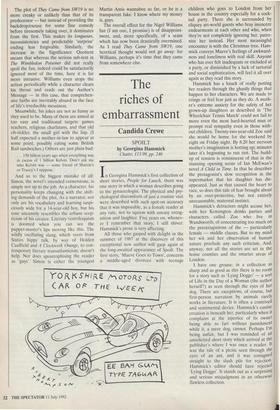The riches of embarrassment
Candida Crewe
SPOILT by Georgina Hammick Chatto, £13.99, pp. 246 In Georgina Hammick's first collection of short stories, People for Lunch, there was one story in which a woman describes going to the gynaecologist. The physical and psy- chological discomforts of just a routine visit were described with such spot-on accuracy that it was impossible, as a female reader at any rate, not to squirm with uneasy recog- nition and laughter. Five years on, whenev- er I remember that story, I still shiver: Hammick's prose is very affecting.
All those who gasped with delight in the summer of 1987 at the discovery of this exceptional new author will gasp again at the long-awaited appearance of Spoilt. The first story, `Maeve Goes to Town', concerns a middle-aged divorcee with teenage children who goes to London from her house in the country especially for a cock- tail party. There she is surrounded by cliquey art-world guests who bray insincere endearments at each other and who, when they're not completely ignoring her, patro- nise her instead. Her most meaningful encounter is with the Christmas tree. Ham- mick conveys Maeve's feelings of awkward- ness and loneliness with real skill. Anyone who has ever felt inadequate or excluded at a party, or diminished by a lack of sartorial and social sophistication, will feel it all over again as they read this story.
Hammick has a knack of really putting her readers through the ghastly things that happen to her characters. We are made to cringe or feel fear just as they do. A moth- er's extreme anxiety for the safety of her grown-up daughters as described in 'The Wheelchair Tennis Match' could not fail to move even the most hard-hearted man or prompt real sympathy even in those with- out children. Twenty-two-year-old Zoe said she would be home for the weekend by eight on Friday night. By 8.20 her nervous mother's imagination is hotting up; minutes later it's beginning to run riot. The build- up of tension is reminiscent of that in the stunning opening scene of Ian McEwan's novel A Child in Time. In that he describes the protagonist's slow recognition in the supermarket that his daughter has dis- appeared. Just as that caused the heart to race, so does this tale of fear brought about by an over-protective, but not entirely unreasonable, maternal instinct.
Hammick's detractors might accuse her, with her Kensington drinks parties and characters called Zoe who live in Wandsworth, of concentrating too much on the preoccupations of the — particularly female — middle classes. But to my mind her wit and her observation of human nature preclude any such criticism. And, anyway, not all the stories are set in the home counties and the smarter areas of London.
I have one grouse: in a collection as sharp and as good as this there is no room for a story such as 'Lying Doggo' — a sort of Life in the Day of a Woman (the author herself?) as seen through the eyes of her dog. There are exceptions, of course, but first-person narration by animals rarely works in literature. It is often a contrived and sentimental device. Hammick's canine creation is beneath her, particularly when it complains at the injustice of its owner being able to fart without punishment while it, a mere dog, cannot. Perhaps I'm being unfair, but I was reminded of an unsolicited short story which arrived at the publisher's where I was once a reader. It was the tale of a picnic seen through the eyes of an ant, and it was consigned straight to the slush pile for rejection. Hammick's editor should have rejected 'Lying Doggo'. It stands out as a surprising and serious misjudgment in an otherwise flawless collection.


















































 Previous page
Previous page